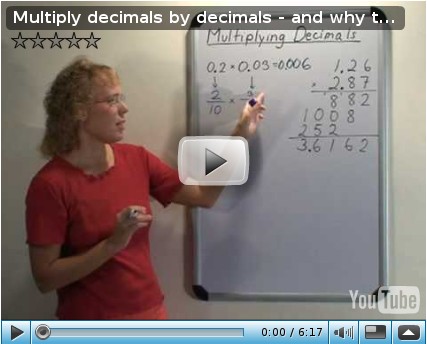Homeschool Math Newsletter, Vol. 36, January 2010
Welcome to 2010! I hope this year will be good for all of us. I hope my newsletter will continue to be of help, as well. Speaking of which, if you missed December's newsletter and the geometry videos in it (or any of the others, for that matter), check the archives. You can always find all past newsletters there! In this month's newsletter:
1. Multiply decimals by decimals 1. Multiply decimals by decimalsTo multiply decimals, we are told to multiply as if there were no decimal points, and then make the answer have as many decimal digits as there are decimal digits in the factors.In the video below, I compare multiplying decimals by decimals to fraction multiplication: 
Do you know where this rule or "shortcut" comes from? It comes from fraction multiplication. For example, 1.1 × 0.005 becomes (11/10) × (5/1000) when it is written with fractions. One decimal digit means the denominator is 10. Three decimals means the denominator is 1,000. When you multiply the fractions, you get 55/10,000. Ten thousand as a denominator means the corresponding decimal has four decimal digits. So, the answer is 0.0055. If you are a teacher, you can approach the rule for decimal multiplication by starting out with fractions, and using examples like the one above or the ones in the video to show students where the rule comes from. 2. Choosing a homeschool math curriculumAt this time of year there are traditionally many people who are just starting to homeschool that might be looking for a math program for your homeschool. I'd like to feature the Homeschool Math Curriculum Guide at HomeschoolMath.net to help all of you who are trying to find a math curriculum for homeschooling.This guide contains:
You are also welcome to leave a review of any curricula you have used in the past, and that way help others to decide. Just head on over to the Homeschool Math Curriculum Guide to find all these resources! 3. High school math videos - freeI wanted to highlight two companies that both offer lots of free high school level math materials in the form of videos. These are real, commercial companies, yet they have chosen to offer the videos online for free. Both have something else they sell, hoping to make some money obviously from that part of the business.The video content can really be of help for all students, teachers, or parents who need additional help with high school math (algebra, geometry, calculus). And since I'm highlighting these two, if you have a topic you have trouble with (such as polynomials or factoring or inequalities) you can even check out videos for that topic in both places. Continue reading. 4. Tidbits
Till next month, Miss something from the earlier volumes? See newsletter archives. Feel free to forward this issue to a friend. Subscribe here.
|
